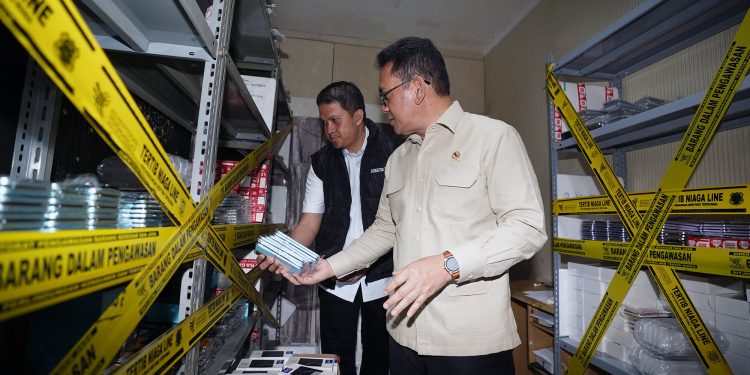Jakarta, Indonesia Sentinel — Indonesia’s Ministry of Trade (Kemendag) has shutdown an illegal smartphone assembly plant operating out of a commercial complex in West Jakarta. Authorities estimate the illicit operation has caused losses to the state totaling approximately Rp17.6 billion (around $1.07 million).
The illegal assembly facility, located in Green Court, Cengkareng reportedly began in mid-2023. According to Budi, the facility was found assembling unauthorized mobile devices and accessories.
Ministry of Trade revealed the plant had produced at least 5,100 smartphones from various brand, valued at around Rp12 billion. In addition, the ministry also discovered 747 boxes containing mobile accessories such as cases and chargers worth Rp5.54 billion.
“The total loss is around IDR 17.6 billion,” Budi said during a press briefing on Wednesday (July 23), as reported by Antara.
The plant capable of assembling thousands of phones per week, using components primarily sourced from China which were reportedly smuggled into the country via Batam. The illegal plant using mostly refurbished or second-hand parts from popular brands like Redmi, Oppo, and Vivo.
“This trader committed multiple violations, including illegal imports and assembling phones with used parts,” Budi said.
He added that the products produce in this illegal plant were later sold online through local e-commerce platforms.
Read Also:
Indonesia Showcases Pacu Jalur in National Tourism Agenda to Promote Cultural Heritage
The Ministry of Trade, in coordination with law enforcement, has seized all illicit products from the facility and confirmed the plant is no longer operating. Budi also stated that his office will continue working with online marketplaces to prevent further distribution of illegal electronics.
“As of now, this company is no longer permitted to operate. We have secured all products and will ensure they are not allowed to conduct similar activities in the future,” he concluded.
Budi stressed that the operation not only harmed state revenues but also posed risks to consumers, as the assembled devices failed to meet established safety and quality standards.
(Raidi/Agung)

























